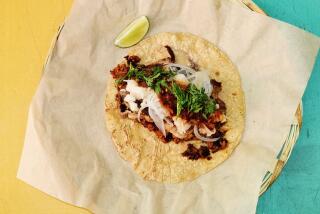South Korea born, East L.A. bred: A Seoul taqueria for a homesick chef
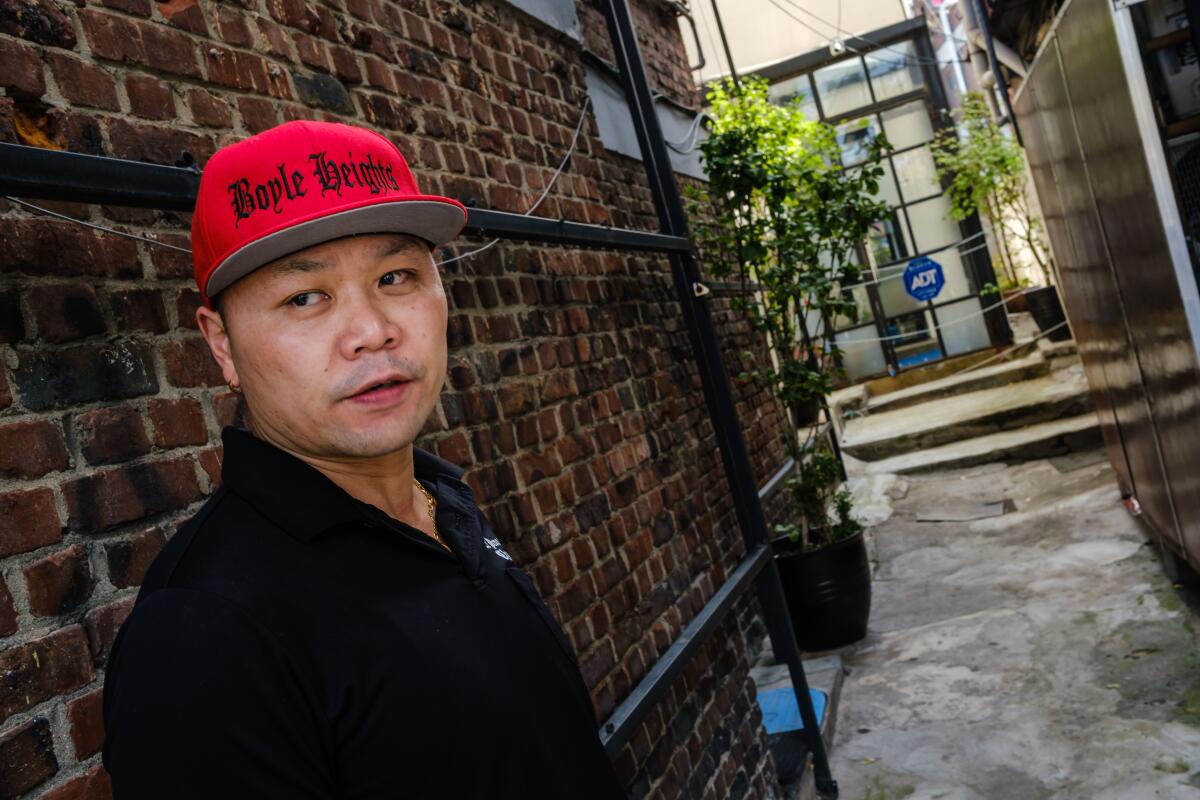
- Share via
SEOUL — At every turn of Christian Morales’ life — and he’s had several lives’ worth of twists and turns — there was food.
At the homes of the foster families he and his sisters bounced around to after being adopted from South Korea, he’d tinker with the sandwiches he was given, to the great annoyance of his foster parents.
At the illegal backyard restaurant in East L.A. run by the Mexican abuela who ultimately raised him, he chopped onions to no end as a middle schooler and learned to cook.
During his years as a drug dealer, he made himself tortillas, rice and beans from scratch to avoid leaving his apartment in daylight, shopping for groceries only at white Orange County grocery stores with less chance of run-ins with the police.
While in the care of the California Department of Corrections and Rehabilitation, he became an expert at fashioning prison burritos, with crushed-up Fritos in lieu of masa.
All those steps led to a second-floor kitchen in a hip neighborhood in Seoul, above a trendy milk tea shop, where he is cooking up carne asada and cochinita pibil, obsessing over the right chiles in his salsas and the texture of his house-made tortillas.
Here, the tatted-up 40-year-old Korean adoptee with a shaved head, thick Chicano accent and streetwise scowl is re-creating the flavors of the closest thing he has to home, a place he is legally barred from returning to since he was deported 17 years ago: East L.A.
Other adoptees return to Korea to search for their birth family, trace their roots and wrestle with questions of identity.
Morales cooks Mexican food. After all, what’s home if not a collection of flavors you pine for?
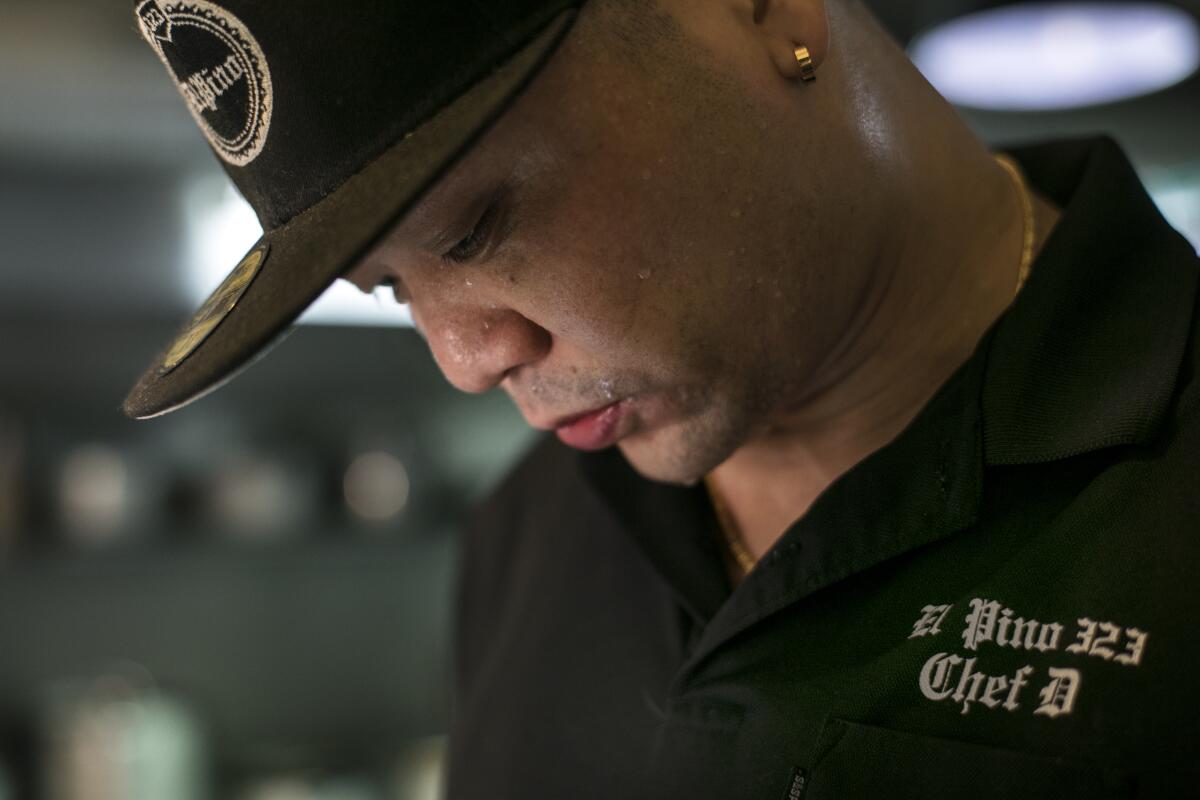
::
His father told his older sister not to let go of her siblings’ hands and promised to be back, before disappearing into the crowd in a busy shopping street in Busan, South Korea.
Morales isn’t sure he remembers the moment or can picture it from the times he was told the story. His memory starts in Sacramento, where he arrived as a 4-year-old with his two sisters in 1983.
They were sent away by their adoptive family less than a year later because his older sister, who was 9, was too much for the parents, he says. She’d starve herself, refusing to eat anything other than rice and kimchi, and throw fits to stop her younger siblings from eating, knocking their plates off the table. They went to a second home somewhere in Central California but were sent packing again a few months later.
When he was about 6, Morales and his sisters ended up in East L.A. with a third family in as many years. In each of the three households there was abuse, physical and otherwise, he says, the details of which he doesn’t care to recount.
It was there in East L.A. that he met his grandma, the mother of his last foster father. Morales says she took him and his younger sister in after learning that her son beat them. By then, his older sister had run away.
In her kitchen, he learned to cook.
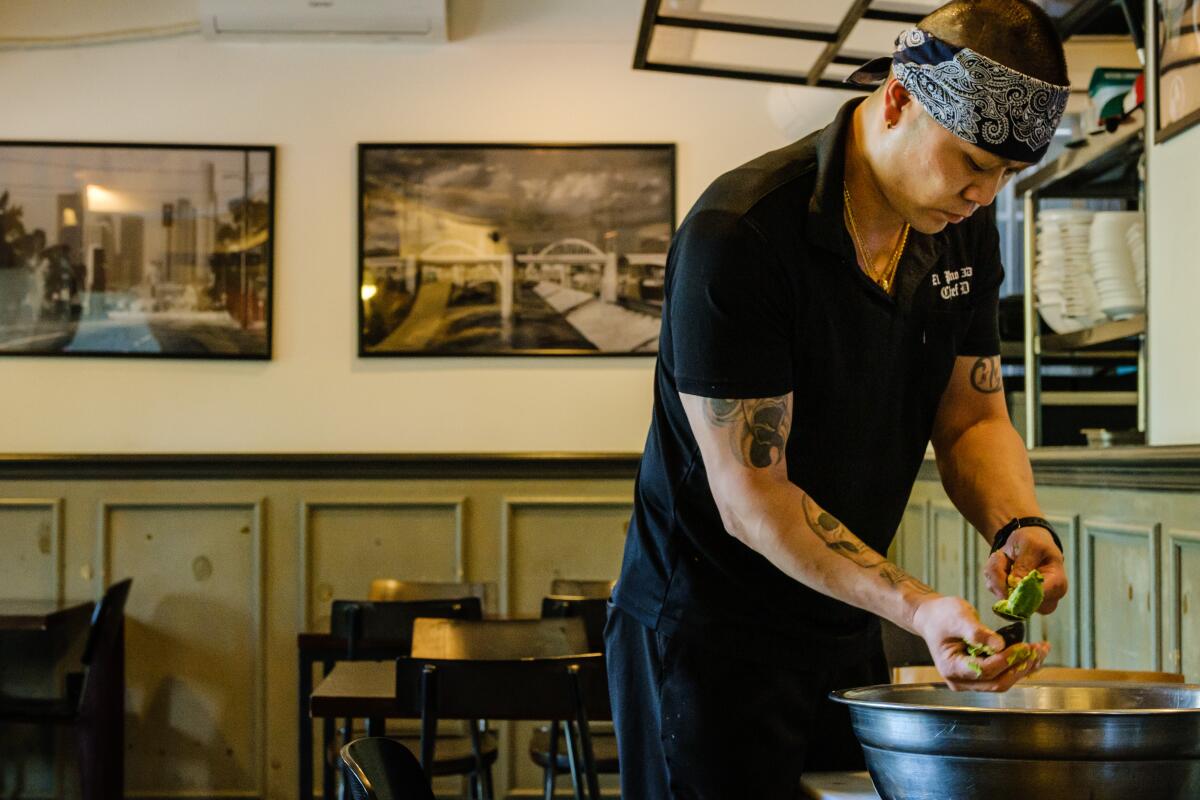
She ran a humble backyard operation serving tacos and tamales on paper plates, with a handful of plastic tables and chairs. People came from as far as Riverside, he recalled. She charged what people could afford — “back then in East L.A., nobody had any money,” he said — which barely covered her costs.
“It was illegal, but everybody in the neighborhood knew the best food came out of my grandma’s kitchen,” Morales said. “She really, really liked that everybody loved her food.”
He chopped vegetables, assembled tamales and pressed tortillas, the two of them cooking side by side.
Outside her kitchen, life in Boyle Heights was rough. Morales had a temper and fought any time anyone picked on him or his younger sister, who, as some of the only Asian kids in the neighborhood, stood out. At 14, he was arrested and sent to juvenile hall, where he was taken under the wing of a South L.A. gang member.
When he got out, he started selling drugs for the gang. He was good at it, easily making $500 a day. It helped that he was Asian, he says, and could dodge drug-dealer stereotypes by donning a pair of glasses. By the time he was 16, he had sellers working for him.
He started making himself scarce at his grandmother’s, not wanting to involve her in his budding criminal life.
Soon, he was locked up again and shipped off to a youth correctional center out of state, where he took vocational classes in cooking, learning knife skills and what he calls “white people food” — meatloaf, mac and cheese, mashed potatoes.
When he was out, he intermittently worked in kitchens at Taco Bell, Sizzler and In-N-Out. He never lasted more than a month or two before getting into a fight.
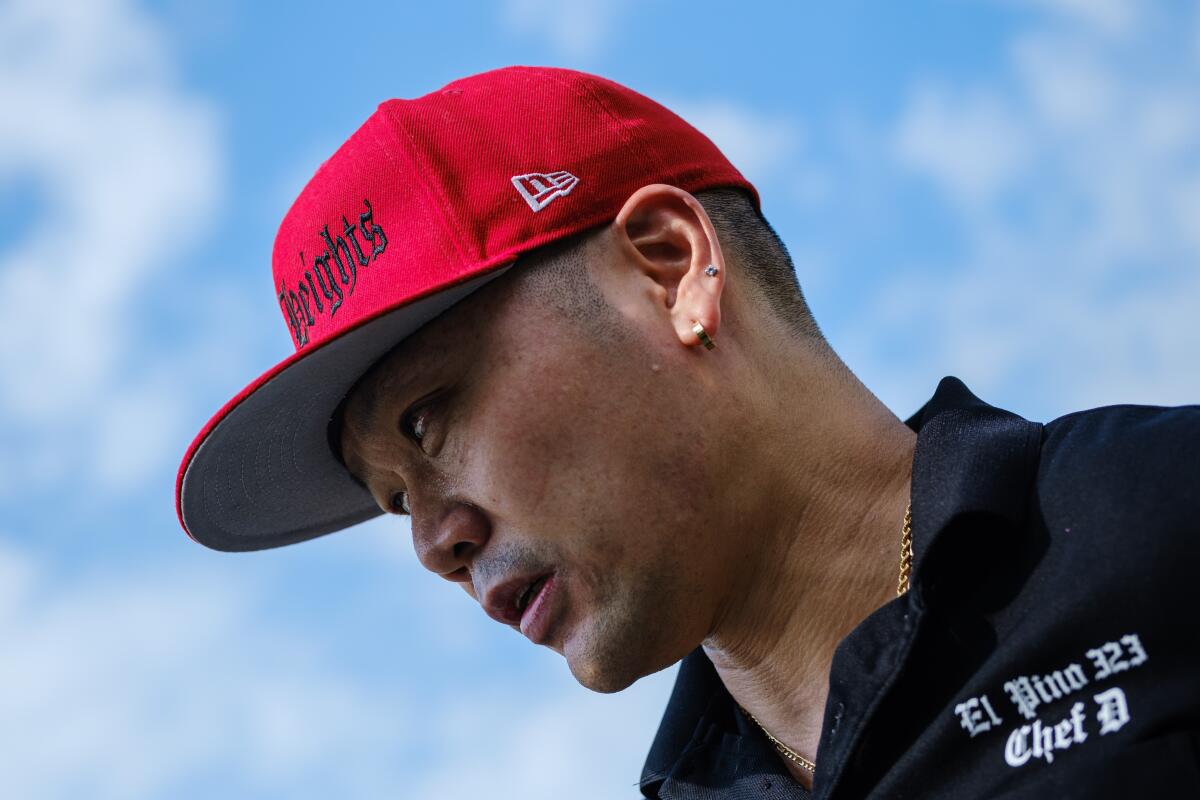
I’m very proud of being from East Los. I’m very proud of the Chicanos I grew up with. My homies always looked at me as one of their own.
— Christian Morales
At 19, he was arrested with two Glocks and a cache of weed and cocaine worth thousands of dollars. Facing up to life in prison with his priors, Morales agreed to plead guilty, serve a three-year sentence and, upon completion, be deported to his birth country: South Korea.
None of his foster parents had filed the paperwork to get him naturalized as an American citizen even though he had been in the U.S. since he was 4. He spoke and ate like any Chicano teenager from East L.A. and didn’t speak a word of Korean or have any memory of the food. But a chance to start over someplace new — away from gang life, away from his volatile childhood — seemed like it wouldn’t be such a bad thing.
In 2002, he landed in Seoul for the first time in 19 years, courtesy of Immigration and Customs Enforcement. He didn’t exactly blend in, with a ponytail, 200-pound prison build and a fresh full-back tattoo he got in immigration detention: a giant tiger and the words “Korean Gangster” in Korean.
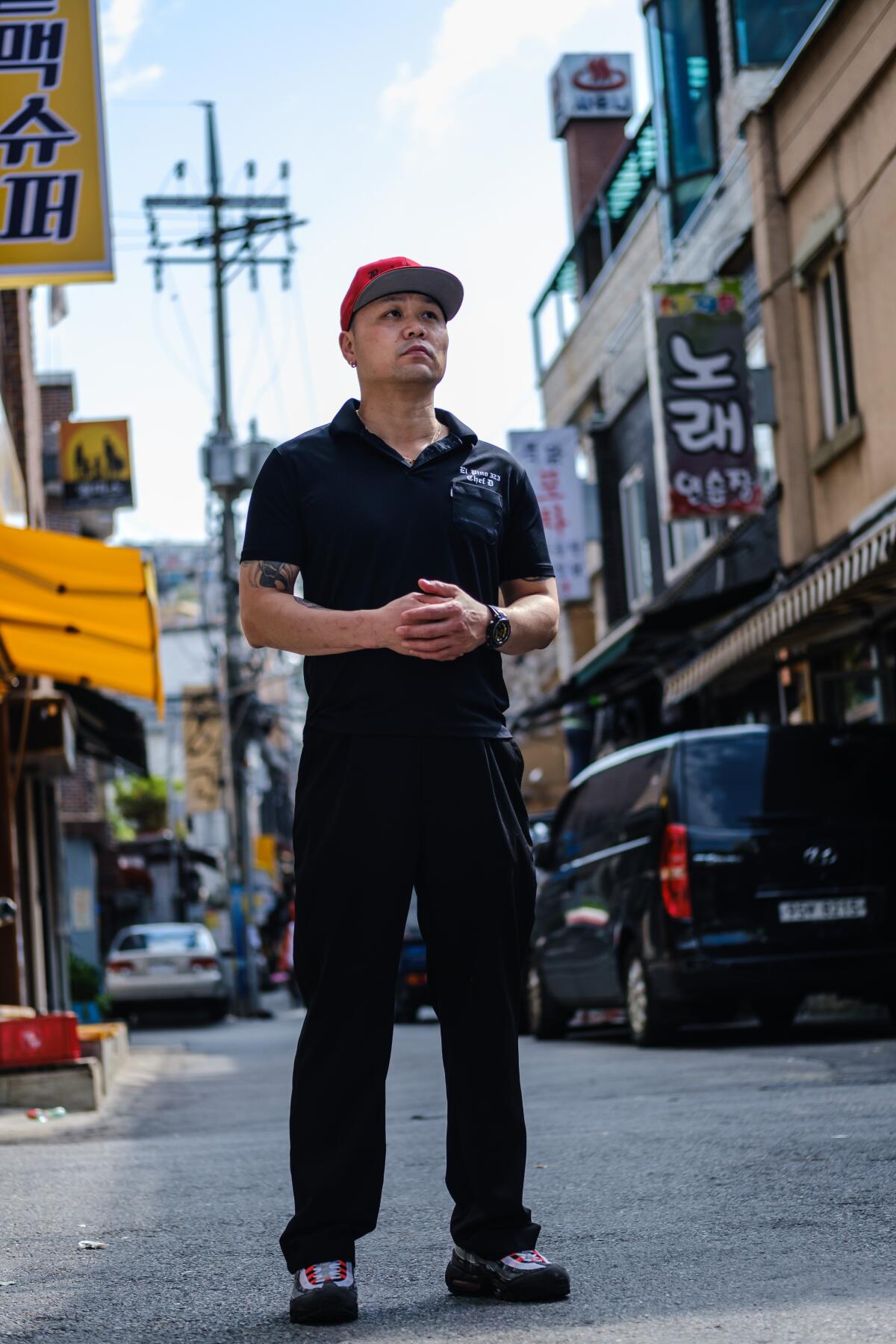
The worst part was the food. The strange smells. The stickiness of the rice. The fermentedness of pretty much everything.
There was virtually no Mexican food to be found. It would be years before even Taco Bell successfully made inroads into South Korea.
For two years, Morales subsisted on Burger King, McDonald’s and soju. Then his drug money ran out, forcing him to turn to cheap Korean eats and learn to stomach kimchi jjigae and Korean ramen. Slowly, he learned to stomach the garlicky, pungent flavors.
Throughout, he called his grandmother every couple of days. She’d tell him to be strong; he’d pretend everything was all right.
He got a job teaching English to kids but couldn’t get food out of his mind. He’d talk about cooking Mexican food to his students and made tacos for them in class. The kids were thrilled; the parents and his employers, less than enthusiastic.
The year he turned 30, he decided to finally pursue the one passion that’d been a constant and that didn’t land him in trouble: cooking.
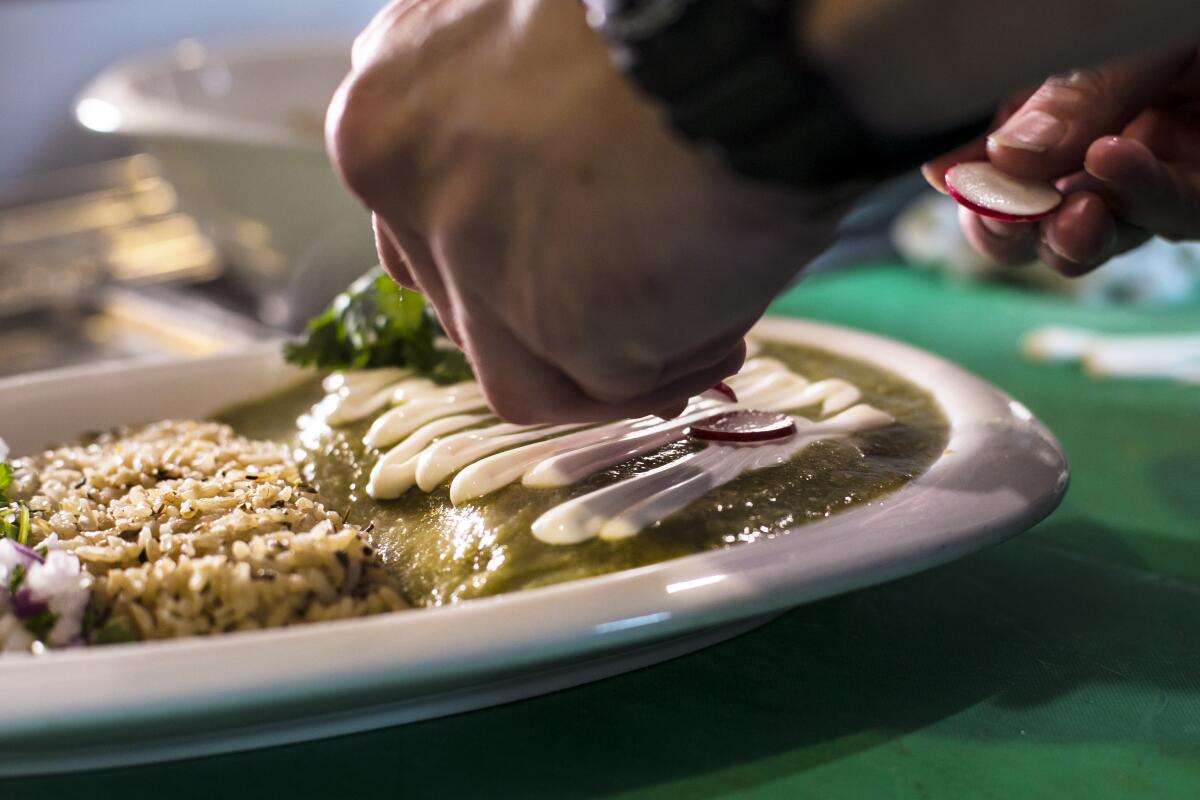
He worked in the kitchens of bars and restaurants in Itaewon, a hilly neighborhood frequented by foreigners in Seoul, mostly manning the grill. A few years in, he began holding pop-up nights serving Mexican food in friends’ apartments and vacant basements. He called it “Taste of Los” and refused to make any accommodations for Korean palates: no omissions of cilantro or sour cream, no salsa on the side. He built on his grandmother’s recipes from East L.A. to create flavors that felt most authentic to him.
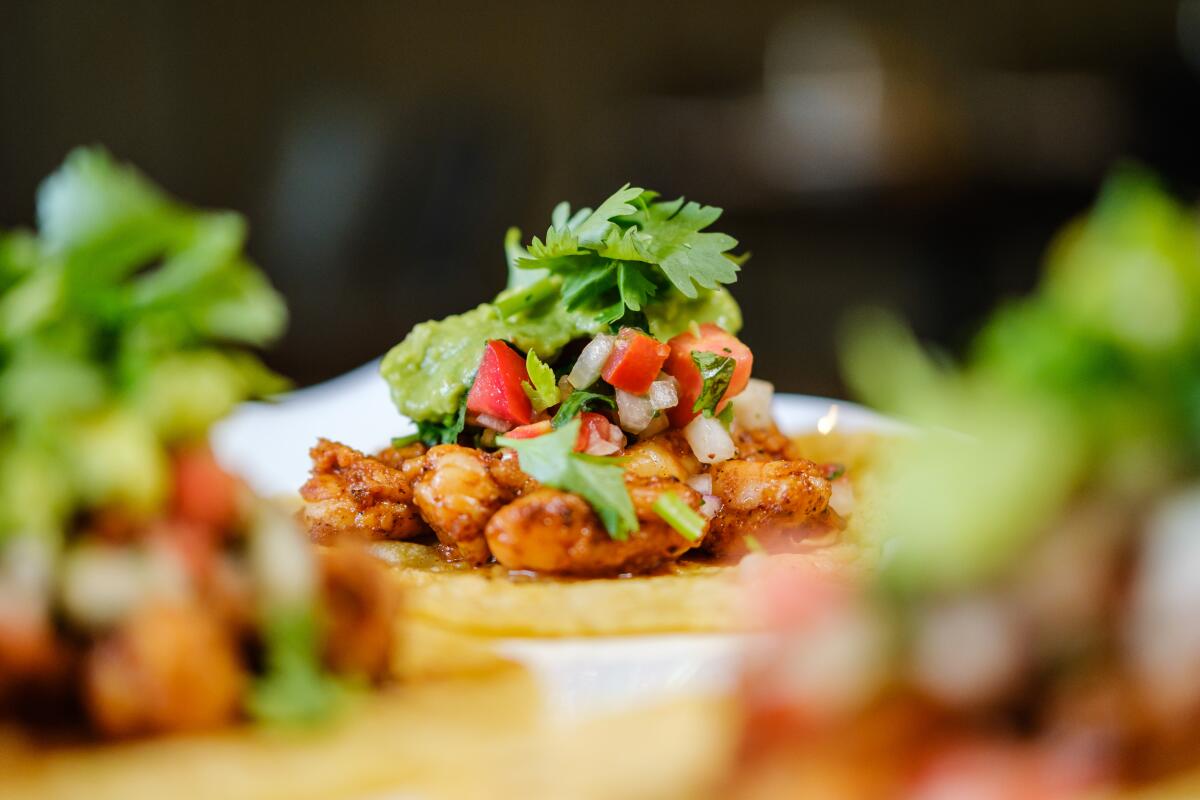
Little by little, he gained a following. People started to take note, offering investments or partnerships. Few followed through though, some questioning whether Mexican food had wide enough appeal in Korea.
In late 2016, Morales and his wife, Kendra Jeong, whom he met in his first few years in Korea, decided to take matters into their own hands. They rented a tiny $600-a-month basement storefront that was previously a nail shop, next to a real estate office and an internet cafe.
El Pino 323, named for an East L.A. landmark and an L.A. area code, opened in October of that year, serving tacos, enchiladas and rice bowls with carne asada, carnitas and mole. On the first day, there was a two-hour wait out the door.
For me, El Pino was finding my own roots, finding my own way.
— Christian Morales
It was supposed to be a takeout and delivery counter, but so many showed up wanting to eat at the restaurant that the couple went to Ikea on the second day to buy tables and chairs to cram into the store. A few months later, they took over the space across the hallway.
::
“Try the tortillas,” Morales urges from behind a row of colorful infused tequilas lining the counter, over the hip-hop thumping from the speakers.
The corn tortillas had been sitting on the table for some time as Jeong tells me how she met Morales in 2006 in Busan, while he was in rehab for alcohol abuse. She was an intern finishing up her training as a counselor, the only one who spoke any English at the facility.
She liked how unabashed and straightforward he was about his past. He made her tamales and sloppy Joes and prison burritos. He’s taught her to savor flavors in food, which she’d previously thought of as little more than sustenance. She taught him to genuinely appreciate Korean food.
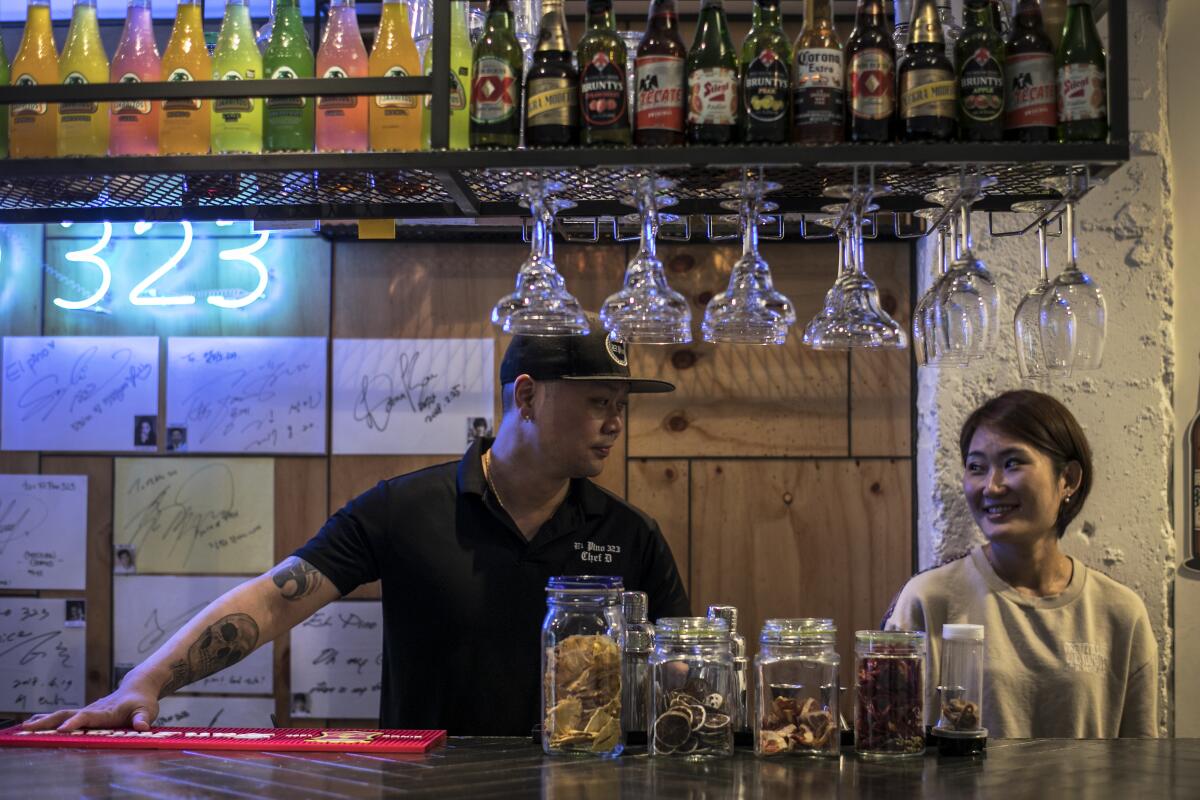
When I bite into a taco and tell Morales the tortilla is still soft, not dry and crackly as masa is prone to quickly become, his typical stony face and clenched jaw give way to a wide, proud grin.
“Even Mexican chefs or restaurant owners come to eat, and they’re like, ‘Is this masa?’ And I’m like, ‘It’s friggin’ 100%,’ ” he says. “And they’re like, ‘How’s that possible?’”
Less than a year after opening, Morales and his wife moved El Pino to a second-floor space with floor-to-ceiling windows and a full bar. A couple months after it opened at the new location, it was featured on South Korean television. Almost immediately, they were turning away customers on weekends.
What started as the two of them cooking in a cramped basement kitchen is now a staff of 12, including two dedicated to making tortillas from scratch. A second restaurant in Pyeongtaek, near the U.S. military base, is due to open in the coming months.
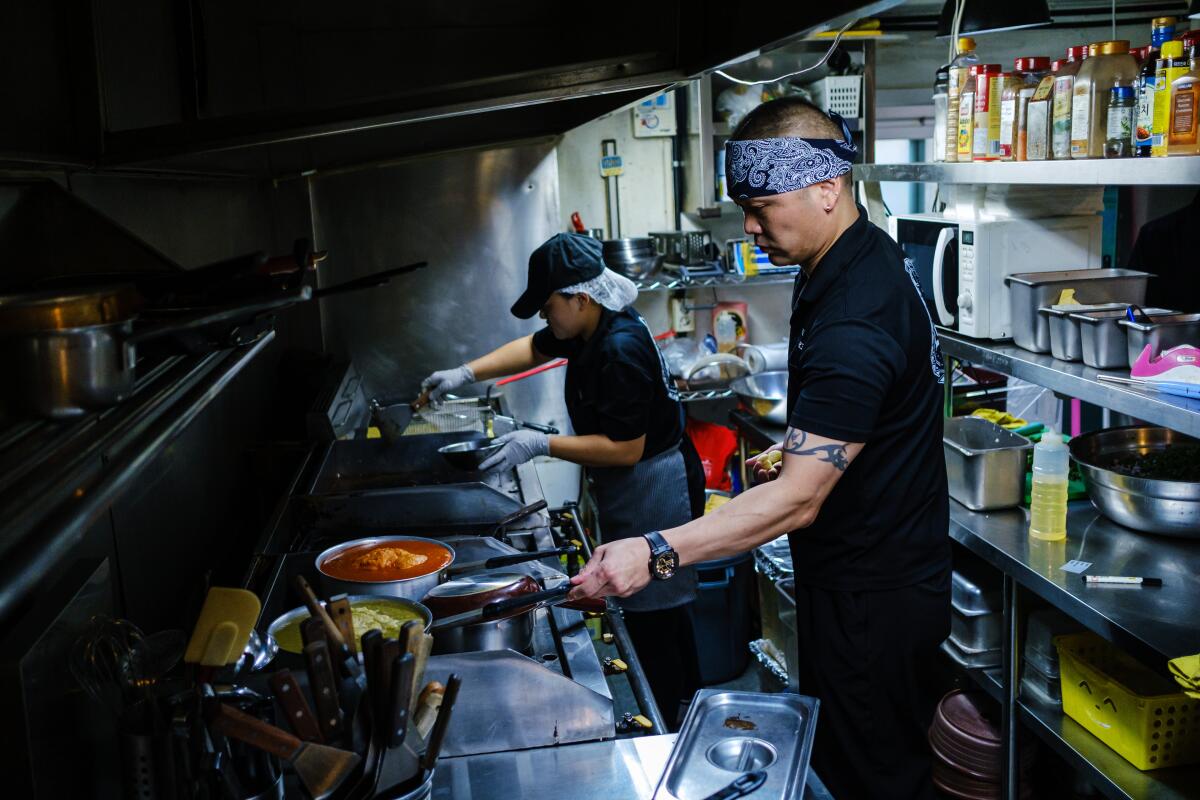
He’s learned barely enough Korean to take a cab or order at a restaurant but now eats Korean food several times a week. Spam and kimchi is a go-to; sticky rice, he still finds off-putting. He eats tortillas every day.
In the early mornings, Morales is in the kitchen by himself, making the salsas and braises the way his grandmother did in East L.A. He keeps her recipes close to his chest.
Those flavors are, in many ways, all he has left of home. His grandmother died a few years after he was deported; his younger sister died of leukemia while he was in prison. He’s largely lost touch with his older sister, who struggles with drugs and pops up now and then when she needs money. East L.A., he’s heard, isn’t what it used to be.
He’s been trying for three years to get an exemption from immigration authorities to return to L.A. for the first time in almost two decades and sort through his grandmother’s affairs, and visit her grave and that of his sister. He’s hopeful it’ll happen in the coming months. He misses Sizzler and Fatburger.
And just maybe, one day, he’ll open up a restaurant in L.A.
“I’m very proud of being from East Los. I’m very proud of the Chicanos I grew up with. My homies always looked at me as one of their own,” he says. “To this day, I hold that pretty close to me.”
“For me, El Pino was finding my own roots, finding my own way.”
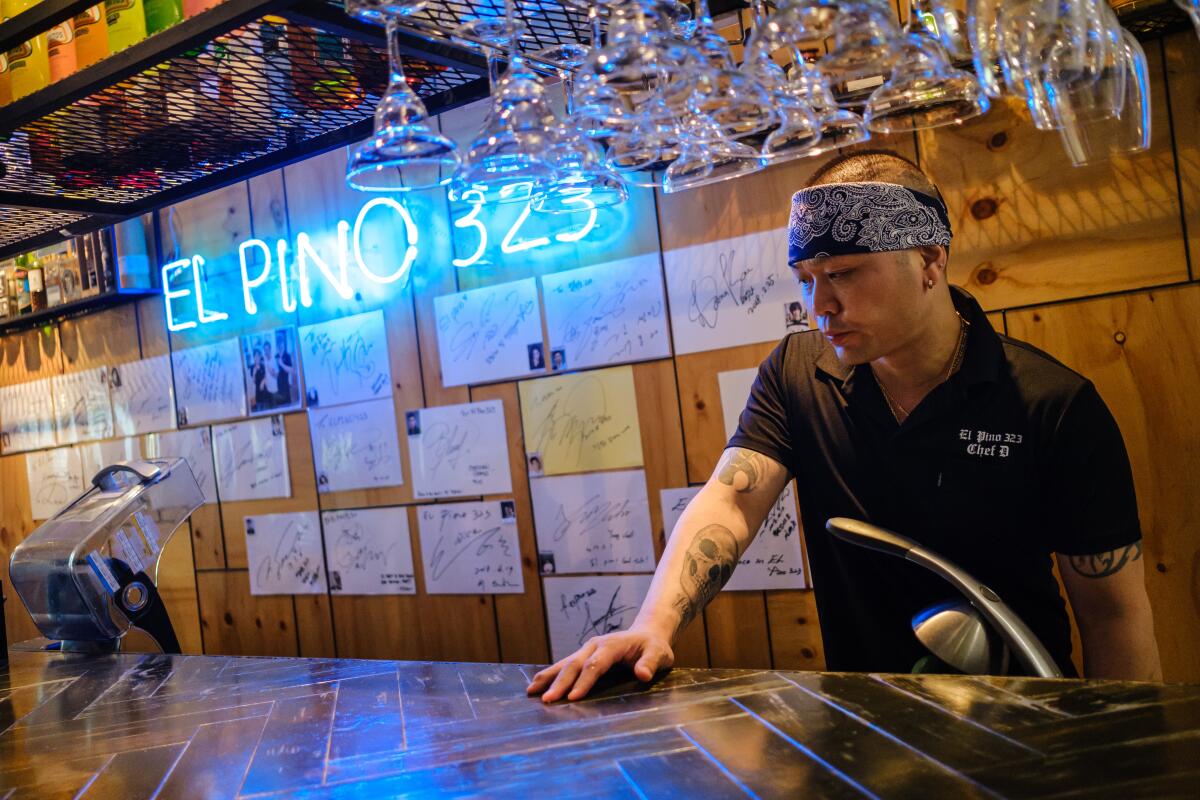
Christian Morales' Seoul haunts
Even though he was born in South Korea, Christian Morales grew up eating Mexican food in L.A. after being adopted at age 4. When he was deported 17 years ago, he couldn’t stomach Korean food, subsisting on Burger King, McDonald’s and soju in his first years back in Korea.
In the years since, he’s learned to love some Korean dishes and found a variety of restaurants he enjoys in Seoul. Here are some of his local haunts.
More to Read
Eat your way across L.A.
Get our weekly Tasting Notes newsletter for reviews, news and more.
You may occasionally receive promotional content from the Los Angeles Times.

